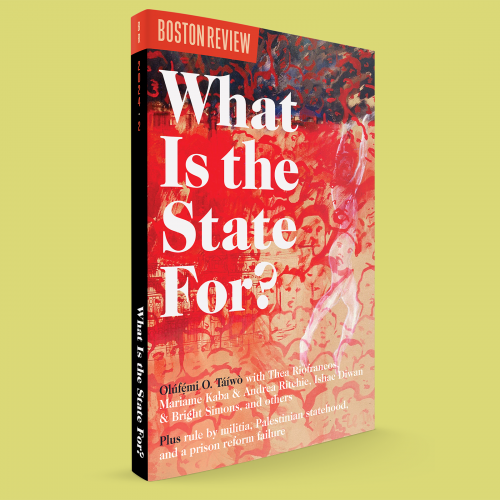Táíwò is right that what Wallerstein called the “two-step” strategy—“first gain power within the state structure; then transform the world”—looks harder to achieve than ever in our world of unfolding climate calamity. But is Táíwò’s updated first step—dethroning the exorbitant and deadly power of fossil capital—any easier to achieve than Wallerstein’s? We agree that fossil capital must be dethroned, but we are not sure how far this alternative takes us.
Decarbonization ultimately requires a sustained and deliberate act of capital destruction on a scale about twice that of the end of slavery. As with the abolition of slavery, it is an inescapable moral imperative—a precondition for a livable human future. But neither capitalists nor state managers have yet shown themselves sufficiently willing to change their behavior in the face of the climate crisis. And while we strongly support nonstatist solutions to create local forms of energy democracy, on their own they do not seem capable of displacing fossil capital on a feasible timeline. The staggering scale of the problem seems to call for the deployment of state power, under the direction of socialist or social democratic political forces. Yet such forces seem far away from being able to exercise or compel such radical state action, which seems to bring us back to where Wallerstein started.
In other words, Táíwò’s two-step may simply be Wallerstein’s in disguise. If this is right, the old problem of securing state power really cannot be sidestepped.
Things might look different if the state had less power than it used to, but the “waning of the nation state,” as Dasgupta put it, was always oversold. Neoliberalism denigrated the state in theory, and it allowed capital to slip the leash of state-based tax-and-spend policies. In practice, however, it relied on the state to enforce private property rights and insulate market measures from democratic politics. It rolled back social democracy and socialism precisely because it rolled back democracy. Rather than dismantling the state, neoliberalism repurposed it, whether as market-maker (via privatization), regulator, or as ameliorative manager of social relations. And the state has remained central to the economic governance and management of capitalism, especially since the 2008 financial crisis—and even more so during the COVID-19 pandemic.
The state remains as powerful as ever—and only the state has the regulatory and planning capacity to intervene at scale and in the manner required to manage the climate crisis and the transition to a decarbonized economy. After all, the throne room of fossil capital is guarded assiduously. Without the concentrated deployment of collective political power that the state makes possible, we are left with the inadequate pantomime of market-based approaches. And as Táíwò no doubt agrees, all such approaches have failed to deliver climate action that is swift or deep or large-scale enough to avert impending calamity. The price mechanism, in particular, is inadequate to the task, as Brett Christophers persuasively argues in his recent book, The Price Is Wrong: Why Capitalism Won’t Save the Planet (2024).
By contrast, the historical record tells us clearly that the state can wield its power to discipline capital and meet existential threats. As talk of a Green New Deal evokes, the state successfully redirected the productive capacity of the U.S. economy under FDR. During World War II, the state engaged in even more direct economic planning, using instruments such as price controls and rationing. And the U.S. state has a long and creditable—though sometimes underappreciated—history of nationalizing politically obstructive capital interests. Similar moves were achieved in Britain under Clement Attlee, with steel and coal nationalization as well as the creation of the National Health Service. The point is that democratic governments have exercised sufficient power in the face of grand challenges in the past, and they can do so again.
Of course, the track record of state action on climate has not been encouraging—at least in the West. The responses of governments of Western democracies seem always too little, too late. As Gus Speth recounts in They Knew: The U.S. Federal Government’s Fifty-Year Role in Causing the Climate Crisis (2021), the U.S. government has known about but ignored or buried evidence on climate change for at least five decades—what Speth calls “the greatest dereliction of civic responsibility in the history of the republic.”
Moreover, even in its boldest forms, existing climate action in the United States and Europe falls severely short for the reason Táíwò identifies: it requires the consent of capital, which at best permits inadequate nudges through regulation, price mechanisms, incentives, and derisking. Incentives to maximize financial returns still predominate over incentives actually to decarbonize, and in a context where capital has learned to manipulate, co-opt, capture, and outmaneuver state oversight, especially through the tax code, “greenwashing” is a pervasive risk. Green subsidies under Biden’s Inflation Reduction Act are flowing to oil companies that continue to extract fossil fuels, for example—hardly a forceful nudge. There is a serious argument for delivering a knockout blow to the fossil fuel industry through nationalization, an approach that could seek to combine a program of state-directed planned decarbonization with the liquidation of the fossil fuel lobby as political actors.
The trouble is not that we lack a plausible vision of how to use state power to enact a just, green transition. The political left in the United States and Europe already possesses the main elements of an ecosocialist agenda capable of doing so. This includes bold and comprehensive economic planning, of the kind that democratic states undertake during times of total war, and alignment with the interests of working people to ensure a just transition. Indeed, the policy platforms of Jeremy Corbyn and Bernie Sanders had already laid out the beginnings of the steps that need to be taken.
Instead, the central issue we face is how state power can be secured and deployed to carry out this agenda. The Chinese Communist Party is in a rather different position, but in the hollowed-out democracies of the West—absent a popular revolution—there is simply no substitute for winning democratic control over the state.
So what’s the path forward? The electoral defeats of Corbyn and Sanders—and the intense hostility that they encountered from the political center—show that it is not enough to articulate a viable economic strategy when the balance of political forces is so solidly arrayed against it. Large chunks of the liberal, centrist camp are simply not willing to work as junior partners in a left-led political alliance, even if the cost is electoral losses to the neopopulist right. The left must face this fact head on as it builds a strategy to win. The task constitutes a generational challenge, but it must be done.
Independent and nonprofit, Boston Review relies on reader funding. To support work like this, please donate here.









